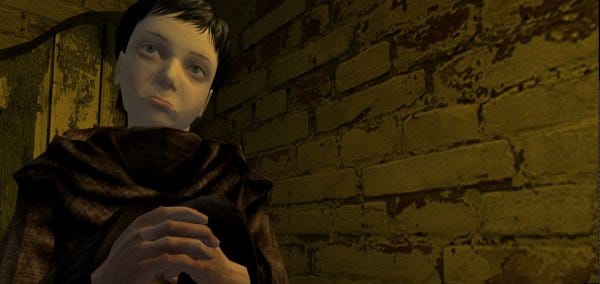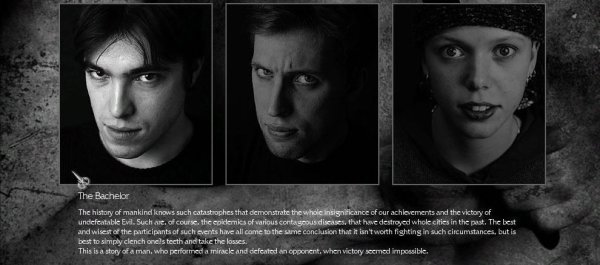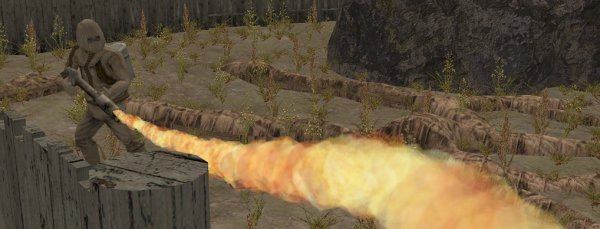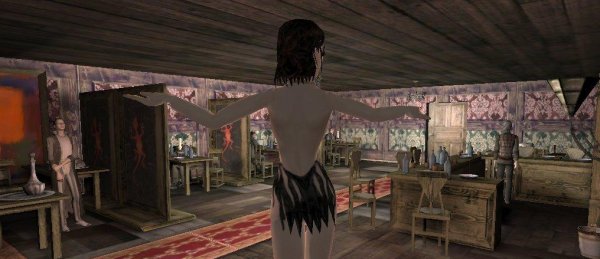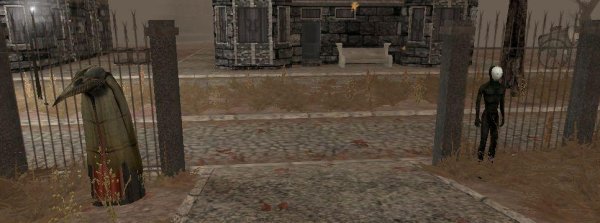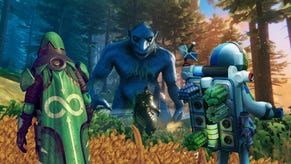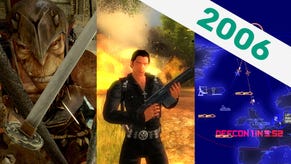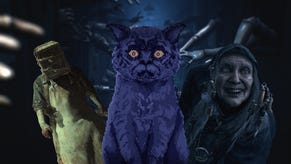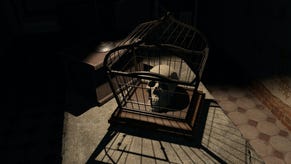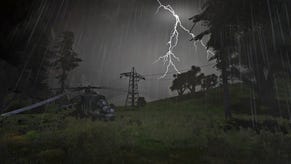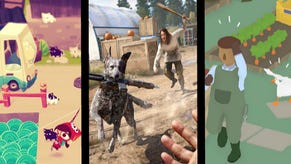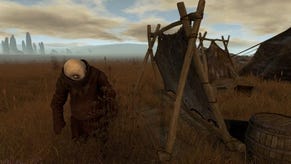Butchering Pathologic - Part 2: The Mind
[Following on from yesterday's installment, Quinns continues his examination of the award winning Russian obscurity Pathologic. Spoilers abound. Oh - and if all this has tempted you, it turns out it is available as a digital download from GamersGate.]
Butchering Pathologic
Part II: The Mind
In a single word, Pathologic is dark. And not "we're going to make our sequel a darker, more adult experience" dark. Not 'teen angst' dark. Pathologic is an endlessly bleak game with an atmosphere that smothers all hope. It's 'pensioner breaking a leg in his bedsit and no one finding out until the smell starts to get unbearable' dark.
Even before the disease breaks out the town is a terrible, ungodly place. It's ugly, completely isolated and ruled in triumvirate by three squabbling families (one industrial, one bourgeois, one intellectual, all of them hungry for power but none of them strong enough to take it). Children are everywhere but none of them can claim any parents, and at night the streets are ruled by furious drunks. The graveyard is maintained by a penniless blind girl who can do nothing to stop endless grave robberies. It's pretty much a stretch to even call it a town- it's a Nick Cave ballad brought to unlife in hideous 3D.
And yet as distant as morals seem to be, Pathologic still manages to feel like the most impossibly vibrant battle of good versus evil as you defend this wretched place, simply because of the sheer horror of your antagonist. The plague hungers, spreads and finally devours, shattering lives with no purpose other than to grow. There can be no moral qualms in what you're doing, only in how you do it.
Ultimately, every obstacle you face in the game is caused by the virus. Everything from gaining entrance into quarantined buildings, to searching for food, to scrapping with rats and militiamen and crazed, infected townspeople. As terrible as life was before the epidemic, it was was life nonetheless. It was human. By contrast, there's something unholy about the disease. It defies classification by the Bachelor's science, and it shrugs off the Haruspicus' concoctions. It even slips away from the Devotress' healing hands. And there's something else about it that's even worse than any of this- but we'll talk about that in part 3.
Now, when you first end a day in Pathologic a message comes up on screen. It tells you, in simple, silent text, how many have died in the village and how many are infected. It also says that there are eleven days left, and it's not lying. When you open your journal you can clearly see twelve tabs, one for each day. The game ceaselessly reminds you of its own span.
Now, to begin with this is comforting. It's just a way of reminding you that this nightmare will be over in a couple of weeks. Then the death tolls start racking up into the hundreds, the thousands, and you witness the sickness and you try and understand it but it only ever becomes more inexplicable and incomprehensible. Everything it does defies explanation.
Then, on one tired night midway through the game as your character staggers to bed, you find yourself thinking. The message comes up again, exactly as it does every night. But this time, you start to wonder what that message actually means.
"After seven days, the game ends."
After seven days, it ends.
What ends?
This nightmare is over.
What ends?
Maybe the town ends.
Or maybe you end.
And then you start wondering if the disease can be beaten at all. And you start wondering if the town deserves it. There's definitely something very final about the plague. As it spreads unchecked it seems to devour more than just life. As you search for the answers you need to beat this sickness, the sickness seems to be eating the very civilization from the town.
And this is another beautiful aspect of Pathologic- the town, your environment, shifts from day to day. Warren Spector's said in interviews that he'd love to set an entire game in one small, wonderfully realised space. Pathologic's town makes you realise the potential of that idea.
On the first day the town is something of a blank slate. The first changes to appear are the zoned off, infected areas where all hope is lost. In these areas the disease is rife, the houses are boarded up and infested with looters, the streets are choked in miasmas and smoke and the dying claw at you for salvation. These areas shift in location from day to day, and have an enormous effect on your actions. Simply traversing them is both a heartache and a risk, and without a weapon and good protective equipment (galoshes, gloves, heavy cloak) you're going to need bandages, medicine and painkillers for yourself when you emerge out of the other side. Course, you need those same medical supplies to ease the pain of those dying in the zones, which is one of the only ways you can keep your reputation up. Decisions, decisions.
By day five, just as these dead zones are poised to engulf the town, you wake up to find that many previously civilized districts have exploded into full-blown anarchy, their streets full of terrified men hurling molotov cocktails at anyone who approaches. With another seven days to go, you get to wondering how on earth the town's going to survive for another week.
The army arrive the next day. Steely Russian soldiers with flamethrowers and rifles, they set up roadblocks and mercilessly gun down the wandering sick. As well as changing the feel of the town, you've got to remember that these developments all completely throw the black market economy you've learned to manipulate.
There's another shift in the town a few days later when the government 'Inquisitor' arrives. Setting up an office in the church, the Inquisitor puts the army on a leash, orders the construction of gallows and calls for the town's leader to be put on trial for allowing civilisation to collapse. And all this happens while the disease pushes on, and on, the noose of the law tightening around your neck at a time when you need more freedom to conduct your research than ever. That's probably a political statement, come to think of it- the Inquisitor calling a halt to everything in the name of justice as the town continues its malignant disintegration.
This organic environment makes sense in the context of the rest of the game, if you think about it. For a game about death to have any gravitas, you're going to have to have a world that feels like it's alive.
So, what we've got here is an awful, cold, beautifully Russian story in perfect keeping the grim game mechanics themselves of raging against the disease while trying to keep yourself alive. So far, so coherent. What we haven't talked about yet is the finer points of the setting that aid this idea even further. The kind of gorgeous details in art direction and character design that can only come about when everyone on a games development team is sharing one vision.
The most obvious of these details is Pathologic's colour palette, a thin wash of lifeless browns and grays. The most subversive of the details is the music, a relentless, natural-industrial track which never stops breathing down your neck and changes from area to area. The most effective of these details is the children. Pathologic's intro cinematic is three kids holding a mock funeral for a tattered stuffed animal. It's got nothing to do with anything, but it does kind of set the tone for the whole game. The children of Pathologic are everywhere, and, as I mentioned above, they're largely abandoned.
Now obviously having kids everywhere is going to be a constant reminder of why you're trying to fight the disease, but the kids represent more than that. The lack of parents has left the kids to form a microcosm within the town, and they're ignoring the stupid grown-ups and engaging in their very own politics and battles.
We're talking Lord of the Flies here. The kids are divided broadly into three main gangs (it's always three with this game; not sure why). There are the kids ruled by Notkin, a tall, tough, charismatic kid, and they live in an abandoned warehouse in the industrial district. Then there are the kids that make their home in the Polyhedron, and finally there are the Dog Heads. The Dog Heads can and will scare the piss right out of you when you first see them. They're a rough and tumble gang who wear the stitched heads of stuffed dogs over their own heads.
The kids are also just as vulnerable as everyone else in the game. While they will try and run from fights, they can still be killed in crossfire and there's nothing stopping you from even stabbing or shooting them and taking their possessions. And these kids, these vicious little murderers, often carry medicine.
If nothing else this puts Bioshock's laughable Little Sister moral decision into perspective. No Big Daddies here. Not even any regular daddies. Just you, you with your quest to save the whole town, and defenseless kids wandering through dark alleys, carrying the pills that'll alleviate your crippling fever. And to think, Bioshock even had the outright gall to pick one of the options of its solitary ethical decision as the 'right' one.
So again, the kids are a side to Pathologic's design which is at once singularly human and completely brutal. We can put that alongside the narrative, the plot, the setting and the game mechanics.
All this adds up to something.
A couple of years ago I had an argument with a friend, one of those differences of opinion that leaves you fuming and coming up with witty ripostes for days afterwards. I was saying that a good game doesn't have to be fun. She was saying that was ridiculous.
My argument, though I botched my explanation at the time, is that games have incredible untapped potential in the field of negative emotions. Just as the lowest common denominator of any art form appeals to 'positive' emotions, whether it's humour, arousal or excitement, so it is that our young games industry is obsessed with the idea of 'fun'.
I think this is one of the core reasons that the games industry hasn't had its Casablanca or Citizen Kane- we're still in the era of musicals and slapstick comedy. No games developer's going to try and make its audience feel sad, or lonely, or pathetic, at least not for long stretches. You might get games that dip their toes into that water from time to time, but by and large developers are keen to keep you smiling.
But that debate is just a big, ugly thorn bush that I've run through too many times already with nothing to show for it. The point is that Pathologic fearlessly wields desperation, brutality, hopelessness, exhaustion, cruelty, even ignorance and pain, and, if you can stomach it, the result is phenomenal.
Pathologic could not ever be described as fun. Tramping back and forth across town, trying to stem the torrent of deaths while aching to know what's going on /is not fun./ This is not a game. There isn't a word for it really, which is probably why the developers, Ice-pick Lodge, call Pathologic "an exercise in decision making" on their translated English website.
There's a good chance I'm losing you here. Let me use a couple of lovely, colourful examples to illustrate the kind of power Pathologic has.
I played through the game at the same time as a friend. He chose the Bachelor, and I was the Haruspicus. Because we played at the same rate, we had the chance to discuss developments in the plot each day. This went wrong fast.
"WHAT THE HELL ARE YOU DOING?" he asked me after we'd both finished day three.
It took me a few seconds to figure out he was referring to the Haruspicus. In his game he'd been sent to investigate a body of one of the infected citizens that had been sliced open and left in the street, and his investigation ended up pointing to me as the perpetrator. But there was no evidence as to why I'd done it. Whereas in my game, yeah, I'd snuck up on a doomed man and cut him open, but I knew it was justified. For thousands of years the Haruspicus had held the right to open the dead in situations like this; what I'd done was the most natural thing in the world. To try and save the thousands of men, women and children in the town who were at risk, I'd brought one death on just a couple of days early. Sue me.
"I needed to see the infected organs" I told my friend, realising as I typed that this defense probably wouldn't hold up in court.
We bickered for a while, each of us oddly firm in the beliefs of our own characters. He called me a murderer, and I called him pathetic. We left it at that.
When I was playing the game the next day I ended up going to a meeting with the Bachelor. The NPC called me a murderer, and our characters bickered. He wanted nothing to do with me. He said that, as doctors, we could never be justified in killing people.
Goosebumps!
But this happened all the time. My favourite was on day 9, some 20 hours into the game, when the same friend started talking about how he couldn't play on for much longer. He said that if things didn't resolve themselves soon he'd give up. He was so tired, he said.
The next day my character went to see the Bachelor to discuss some findings, and I found a man overcome with exhaustion. The Bachelor said that if we couldn't discover the truth about this disease soon he was going to shoot himself rather than let the illness kill him.
This is what Pathologic does. It creates an interesting, desperate situation and brooks no compromise in letting you experience it. And in unflinchingly making you suffer, you identify with these characters you control to the point of becoming them.
So, Pathologic is a grand experiment in characterisation. It's as daring and unique as one of those 15 minute indie games that everyone raves about (and rightly so!), only blown up into a 40 hour epic. Considering everyone's always talking about how wonderful it'd be if those same indie developers could get a team and a budget, that makes Pathologic quite the achievement.
Of course, Ice-Pick Lodge happened to be a little more ambitious than that. They had to think bigger. After drawing up this blueprint for a brazenly intellectual game that covered all this new ground in so many different directions, they still wanted more.
Specifically, I think they wanted to be art. And Hell if they didn't pull out all the stops and end up putting together one of the most staggering reveals in gaming history.
